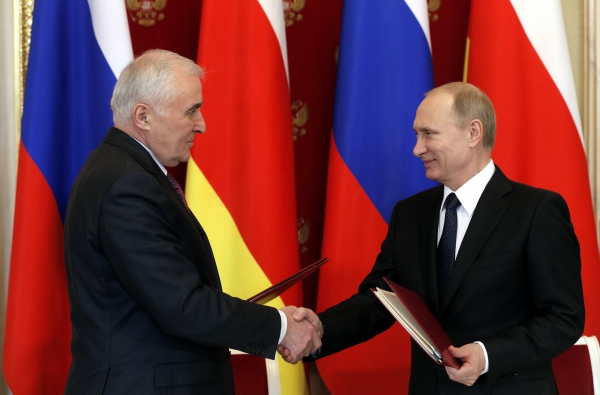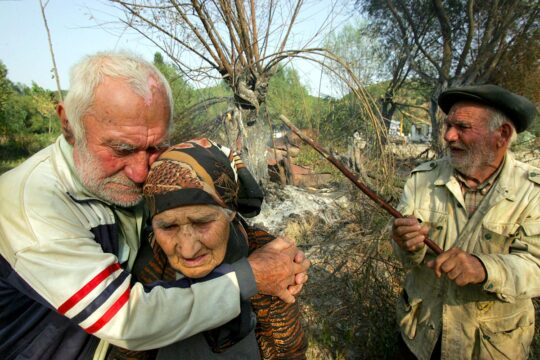On January 27, judges of the International Criminal Court (ICC) authorized Prosecutor Fatou Bensouda to start an investigation into crimes committed during the Russo-Georgian war of summer 2008. This will be the first prosecution investigation outside Africa. The decision is backed by NGOs in Georgia and community representatives in displaced people’s camps. When asked by the Court whether they would support an investigation, 6,284 victims said yes, whilst only 51 said no because they fear reprisals.
So now the Court is looking at war crimes and crimes against humanity committed in and around South Ossetia between July 1 and October 10, 2008. The investigation will cover in particular attacks on civilians, murder, persecution, looting and forcible transfer of population. According to the Office of the Prosecutor, crimes committed against Georgians of South Ossetia left between 51 and 113 people dead, destroyed some 5,000 homes and displaced between 13,400 and 18,500 people. The Prosecutor says 75% of ethnic Georgians in South Ossetia were driven out.
Georgia suspends its investigation
In summer 2008, amid increasing clashes between Ossetian separatist forces and the Georgian army, Georgian President Mikheil Saakashvili launched an offensive on the night of August 7 to take back South Ossetia, which had been independent de facto since the 1990s. Russian forces then launched a big military operation, invading part of Georgia. On August 14, the ICC prosecutor decided to open a preliminary examination. Both Moscow and Tbilissi said they were investigating and cooperated with the Prosecutor in The Hague in a way that was reasonably satisfactory. But in March 2015, the Georgian authorities said they had suspended their investigations until further notice because of security problems “in the occupied parts of Georgia”, since “violence against civilians is still going on”. In October 2015, Fatou Bensouda therefore asked the judges for authorization to open an investigation, which they granted on January 27.
Russian investigation
Whilst Georgia has suspended its investigations, the Russian investigations are ongoing but do not satisfy the Prosecutor. Between 2010 and 2014, the Committee of Inquiry of the Russian Federation examined 575 incidents reported by alleged victims of Russian soldiers, but concluded that commanders of the armed forces had taken the required measures to prevent looting, violence and indiscriminate use of force. It did not confirm that Russian soldiers were implicated in crimes committed in “the Georgian and Ossetian territories”. The ICC Prosecutor’s information suggests that Russian soldiers participated in crimes committed by Ossetian forces or stood passively by. The judges therefore gave her a green light to investigate.
They did not, however, grant authorization to investigate attacks on Russian soldiers of the joint Russo-Georgian peacekeeping mission (established by a peace accord in Sotchi in 1992), deeming that Russia has not shown “either unwillingness or inability” to prosecute. The ICC is a court of last resort which, according to its rules, can only intervene if national authorities are unwilling or unable to prosecute international crimes. Shortly after the Prosecutor submitted her request in October 2015, the Russian Foreign Minister protested, saying Georgian forces attacked Russian soldiers of the mission, killing 10 of them. He also criticized the Prosecutor for not including murders of Ossetians, saying that her initiative in effect exonerated the regime of Mikheil Saakashvili, who was in power in Georgia at the time. The prosecution request points out that the de facto president of South Ossetia, Edouard Kokoïty, was head of the army and that former high-ranking Russian military men headed the ministries of Defence and Interior, as well as the state security committee. The ICC Prosecutor does not say at this stage if Russia had overall control, but nevertheless evokes its influence. “According to the Kremlin, training of South Ossetian forces for the conflict, as well as mobilisation of Russian military equipment and weaponry, was conducted on the basis of a plan drawn up by the Russian Army’s General Staff in 2006-2007, and subsequently approved by Russian President Vladimir Putin,” says the Prosecutor’s request. With regard to Georgia, the Prosecutor points to implication of the Interior Ministry and several battalions of the regular army.
The case could set a precedent. Unlike Russia, Georgia has ratified the ICC treaty (in September 2003) giving the Court jurisdiction for crimes committed on its territory, whatever the nationality of the suspected perpetrators. A similar situation, Afghanistan, has also been under preliminary examination since at least 2008: Afghanistan has also ratified the ICC treaty. The Prosecutor has not opened an investigation but has mentioned in her reports the implication of the government in Kabul, the Taliban and American forces. Like Russia, the US has not ratified the ICC treaty. A year ago, the Prosecutor also started a preliminary examination of crimes committed in Palestine. Israel has not ratified the ICC treaty.






